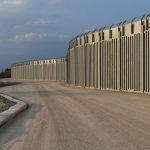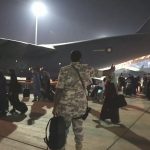After closing its international borders for two years New Zealand is reopening to the world – if you can a manage to find a flight there.
On Wednesday the first foreign visitors to arrive in the country since the start of the pandemic touched down in major cities including Auckland, Wellington and Christchurch.
Only Australian citizens and permanent residents are allowed in so far.
The border will open to countries that don’t require a visa to enter such as the UK and US on 2 May.
All Qantas flights from Australia to New Zealand are booked up for the first few days after reopening.
I flew from Sydney to Wellington with Air New Zealand.
Even a one hour delay at departure couldn’t wipe the smiles off people heading to New Zealand to see relatives and friends.
COVID-19: US orders non-emergency diplomatic staff to leave Shanghai amid strict lockdown
Queen’s personal adviser Angela Kelly became her hairdresser during lockdown
Brexit and COVID transform industry as warehouse numbers booming
‘Worth it to protect the elderly’
Colleen Paul is a New Zealand passport holder travelling with her two children, who hold Australian passports. It’s been more than two years since they’ve been back to see relatives.
The cost of the flight was more than double the usual price and it’s a long trip. The family are flying from Brisbane to Sydney, then Wellington in New Zealand and finally on to Auckland. Direct flights from Brisbane were sold out.
Speaking to her mother and sister on the phone from Sydney Airport, Colleen Paul said the closed borders had been “worth it to protect the elderly” and keep New Zealand’s COVID-19 death toll low.
‘The message in New Zealand was that people were more important than borders’
London resident Kate Wilton agrees. She’s flying to the New Zealand capital Wellington to see her two eldest children and grandson and told Sky News she’s feeling “pure, unbridled excitement and relief”.
Kate said she would have flown home sooner but couldn’t get a place in hotel quarantine as the limited spots were awarded via a lottery system. Kate says the quarantine system should have been expanded to allow more nationals home.
However, she also says New Zealand’s isolation and closed borders allowed it to reach a high rate of vaccination before Omicron hit.
“The message in New Zealand was that people were more important than borders and the priority was preserving life,” she said.
For most of the pandemic it worked. The country has recorded only just over 500 deaths.
With one of the strictest border entry policies in the world and hard lockdowns the COVID-zero policy in New Zealand was the envy of many other countries.
But not even New Zealand could escape the Omicron wave. It’s now recording 9,000-10,000 new cases of COVID a day.






















